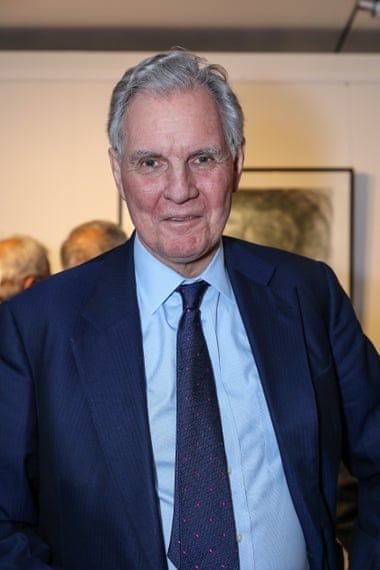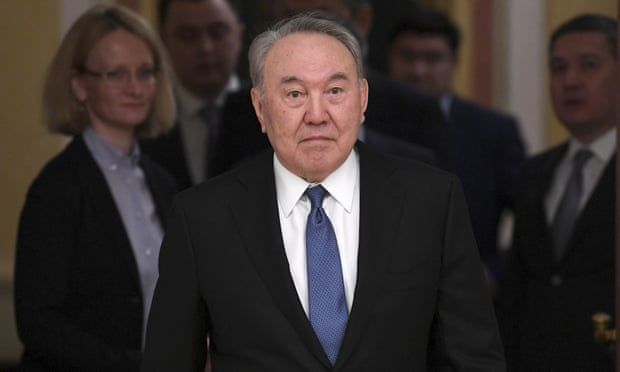Pandora papers cast doubt on ex-Tory minister’s claim he received no payment from Kazakh government for flattering biography
In April 2010 Jonathan Aitken flew to Washington. The former Conservative MP and minister, famously jailed for lying, was in the US for the launch of his latest book: a flattering biography of Kazakhstan’s president, Nursultan Nazarbayev. “Biographers are artists on oath,” he told an audience of senators and diplomats. “They like painting on a broad canvas.” He added: “I have never had a more dramatic and turbulent canvas than the life story of Nazarbayev.”
Aitken’s speech at the prestigious Library of Congress failed to mention one crucial point: that a PR firm working for the Kazakh government appears to have secretly commissioned and paid for his book. According to the Pandora papers leak, Aitken got £166,000 for his literary efforts. The money was routed via Hong Kong and the British Virgin Islands and discreetly sent to Oxford and the ex-MP’s company, Aitken Consultancy & Research Services Limited.
According to the documents, the firm, WorldPR, also picked up the bill for Aitken’s overseas book tour. His expenses included a stay at the Capital Hilton, two blocks from the White House. Aitken’s $1,527 (£1,117) receipt – found in the leak – lists three nights’ accommodation, laundry, a meal in the bar and grill, as well as Twigs restaurant, plus high-speed internet access. The PR company paid the Library of Congress $6,996 for venue hire, with the Kazakh embassy bankrolling a later speaking engagement at New York’s Harvard Club.
 Professing to have rediscovered his Christian faith in prison, Jonathan Aitken became a clergyman three years ago.
Professing to have rediscovered his Christian faith in prison, Jonathan Aitken became a clergyman three years ago.
Ironically enough, Aitken’s political career came to a dramatic and sticky end in 1996 after he lied in the high court about who had paid for a similar stay at the Ritz hotel in Paris – not a central Asian dictator back then, but the king of Saudi Arabia’s son. Aitken sued following revelations in the Guardian and by the programme World in Action that he had done the bidding of the Saudi royal family, working since the 1970s as a glorified fixer.
The latest revelation is embarrassing for Aitken, who claims that he emerged a reformed character from a seven-month jail sentence after he was convicted of perjury in his libel action against the Guardian. The paper disputed Aitken’s untrue claim that his then wife, Lolicia, had paid the Paris bill. On his release Aitken wrote a memoir, Pride and Perjury. Professing to have rediscovered his Christian faith in prison, he became a clergyman three years ago: the latest episode in the life of a gifted but flawed individual who once aspired to be prime minister.
Aitken remains a high-profile public figure. He was ordained at St Paul’s Cathedral and has been working as an unpaid prison chaplain, attached to a parish in Westminster. He has been a member of a Conservative party taskforce on prison reform and has served as a trustee on the board of several criminal justice charities. He has also spoken at religious meetings and at the House of Commons. “I am having a slight struggle tempering my enthusiasm with proper Christian humility,” he said, before acquiring his reverend status.
In the acknowledgements to his book, Nazarbayev and the Making of Kazakhstan: From Communism to Capitalism, Aitken thanked the Kazakh foreign ministry. It had paid for his hotels in Astana, the country’s capital, and Almaty, he said. Beyond this, Reuters reported that Aitken told the agency he received no payment from the Kazakh government – a claim that now appears to have been misleading.
Nazarbayev was a popular and compassionate leader, who had built a successful economy and rid his country of Soviet-era nuclear weapons, Aitken wrote.
The critics were unconvinced. The Guardian described the biography as “a fascinating, cleverly orchestrated snow job: quite probably the hagiography of the year”. The London Review of Books was similarly damning and said its flattery ranged “from the banal to the cringing”. All remarked that it glossed over Nazarbayev’s autocratic behaviour and intolerance of dissent. Torture by his security forces was widespread and “carried out with impunity”, Amnesty International noted.
According to the documents, the under-the-table payments were made by WorldPR, a firm run by Aitken’s one-time press adviser Patrick Robertson. Robertson is Kazakhstan’s honorary consul to the Bahamas. Its website says WorldPR has “worked for multiple Kazakhstan government departments and agencies since 2004”. Other clients include the late Chilean dictator Augusto Pinochet and Azerbaijan, another oil-rich post-Soviet state known for persecuting opponents, while it also ran a “Global Britain” campaign.
According to the leaked files, WorldPR bought 3,000 private copies of Aitken’s book from the publisher Continuum, now a part of the Bloomsbury Group. This cost £30,000. Overall, the biography sold 466 actual copies, bought by the public from bookshops and online. Robertson spent $96,000 in Russia on “media consultancy services” and paid a Moscow publisher $116,000 to translate Aitken’s follow-up book, Kazakhstan and Twenty Years of Independence. The deal included 10,000 Russian language copies and a media launch.
 The former president of Kazakhstan, Nursultan
Nazarbayev. Reviews of Aitken’s book remarked that it glossed over
Nazarbayev’s autocratic behaviour.
The former president of Kazakhstan, Nursultan
Nazarbayev. Reviews of Aitken’s book remarked that it glossed over
Nazarbayev’s autocratic behaviour.
Robertson is an ardent Brexiter who lives in St Moritz, Switzerland. While a student at Oxford he founded the Bruges Group, a rightwing thinktank whose advisers and members have included a series of high-profile Tories, including Margaret Thatcher. Robertson remained friends with Thatcher. In 2011 Robertson sent the former prime minister a £100 bunch of flowers, his offshore records show.
WorldPR’s “strategic communications” activities have been a source of controversy. According to the book Kleptopia by the Financial Times reporter Tom Burgis, Robertson was closely involved in a “black PR” campaign against the fugitive Kazakh businessman Mukhtar Ablyazov. This included “covert operations”, a plan for “cyber-assaults” and “media manipulation generally”, the book alleges. Robertson sent Ablyazov’s lawyer abusive texts, it also claims.
The Pandora documents suggest Aitken received his covert book payments between 2007 and 2010. An invoice dated April 2009 from Aitken’s firm to WorldPR for £33,333 is marked as “agreed final instalment fee for book project”. It is unclear if this cash covers one or both of Aitken’s Kazakhstan titles. WorldPR is based in Hong Kong and registered in Panama. Fidelity Corporate Services, an offshore management company in the British Virgin Islands, handled its financial accounts, which run into hundreds of pages.
The files give an insight into Robertson’s methods. In 2011 he set up a covert spinoff operation, Sovereign PR, to handle a lucrative new contract with Azerbaijan’s state oil company, Socar. Robertson fired off a plan of action for his client. It included setting up a pro-regime “thinktank”, commissioning two books on the Nagorno-Karabakh region, claimed by Azerbaijan, and holding a “grand debate” at the Royal Geographical Society in London.
Meanwhile, Aitken was rewarded for his biographical labours with a medal. In 2017 the Kazakh ambassador to the UK, Erlan Idrissov, gave him a government award. It was in honour of Aitken’s contribution to promoting the country’s global reputation, Idrissov said. Aitken did not respond to an email asking for comment or to two letters sent to his home address in London. Similarly, Robertson did not reply to three emails, a letter and a message left on his mobile phone. Bloomsbury declined to comment. It would not say if publication of the book was contingent on a deal to buy private copies.















